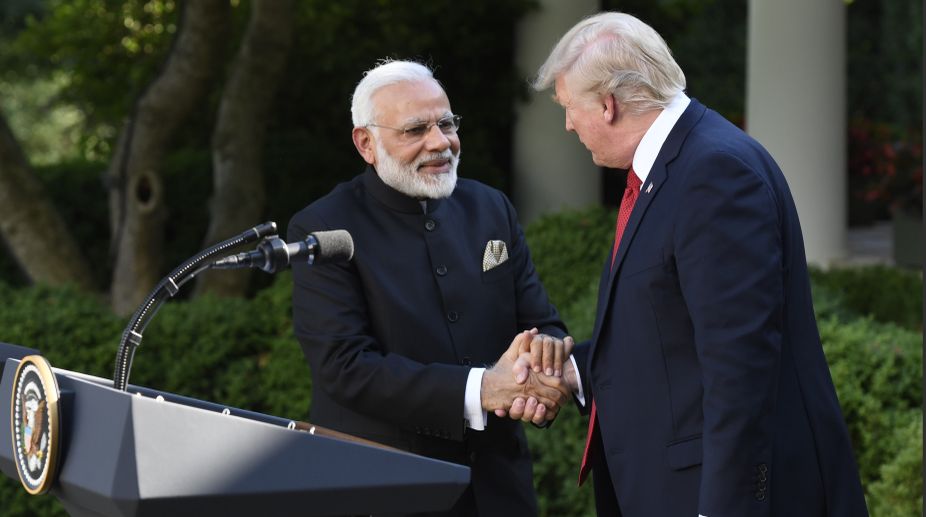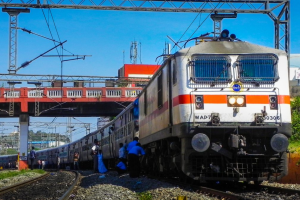The Trump administration has told US Congress that defence cooperation with India would be an important pillar in the bilateral relationship as it needs the country to be a net security provider in the Indo-Pacific region.
The Trump regime has informed the Congress that it “strongly supports” transfers of F-18 and F-16 fighter proposals put forth by Boeing and Lockheed Martin respectively.
Advertisement
These proposals have the potential to take Indo-US defence ties to the next level, it said.
“The reason why defence cooperation with India is so vital to US interests is because we need India to be a net security provider in the Indo-Pacific, a region that serves as the fulcrum of global trade and commerce, with nearly half of the world’s 90,000 commercial vessels many sailing under the US flag, and two-thirds of traded oil travelling through the region,” Alice Wells, acting assistant secretary of state for the South and Central Asian Affairs told a Congressional Subcommittee in a written submission.
Wells is scheduled to testify before the House Foreign Affairs Subcommittee on Asia and the Pacific on “Maintaining US Influence in South Asia: The FY 2018 Budget,” on Thursday.
She said in her submission that the Indo-Asia Pacific region is also home to nearly half of the planet’s population and some of the fastest growing economies on earth.
“Working with like-minded partners, India has the strategic and economic potential to uphold the international order that has served so much of humanity over the past seven decades. The investments we make in our security partnership now will pay dividends for decades to come,” she said.
As fellow democracies, countering terrorism is the critical priority for both India and the United States, she asserted.
“India is situated in a dangerous neighbourhood, where terrorist attacks have killed both Indians and Americans alike. Joint training and capacity building are essential to expanding our CT cooperation,” she said, citing the State Department Anti-Terrorism Assistance (ATA) program in which more than 1,100 Indian security personnel have received training from the US since 2009.
Wells said India is among America’s most important strategic partners in the Indo-Pacific region.
“In the words of President Trump, the relationship between India and the United States has never been stronger, has never been better,” she said in the testimony.
“The President’s first meeting with Prime Minister (Narendra) Modi in June set a positive tone and ambitious agenda for strengthening bilateral ties, particularly in the areas of defence, energy and trade,” she added.
Talking about the trade between the US and India in her written submission, Wells said the economic relationship has largely been on a positive trajectory and America needs to do more to balance the trade deficit between the two countries, which totalled nearly $30 billion in 2016.
“We are working closely with USTR and the Commerce Department to address the concerns of the US business community regarding India, including tariff and non-tariff barriers, subsidies, localisation policies, restrictions on investment, and intellectual property concerns that limit market access and impede US exporters and businesses from entering the Indian market,” Wells said.
“Our bilateral trade has more than doubled in the last decade from $45 billion in 2006 to more than $114 billion in 2016. US exports to India support more than 260,000 American jobs across all 50 states,” she said.
In 2016 alone, investment from Indian companies supported more than 52,000 jobs in the United States, she added.
She said the Trump administration is committed to ensure that the trade relationship with India is fair and reciprocal, and continue to press India to further open its markets and create a level-playing field for US companies.
According to Wells, tremendous opportunities lies in India’s civil aviation market.
In early January 2017, SpiceJet, a private Indian airline, announced an order of 155 new Boeing 737 MAX 8s, taking its tally for the aircraft model to 205 total planes.
The final assembly of the MAX 737 takes place at the Boeing production facility in Renton, Washington.
“…these transactions have an estimated value of $23 billion and according to Boeing, would create or sustain more than 130,000 jobs in the US,” she said.
Another private Indian carrier, Jet Airways, ordered 75 737 MAX 8s in 2017, she added.
“We also see significant opportunities in the energy sector. India is the third-largest energy consumer in the world after China and the United States, and its large and growing population ensures it will remain one of the largest energy consumers for decades,” she added.
“India’s state gas utility, for example, signed a 20-year supply agreement with US-based LNG producer Cheniere Energy and has already taken delivery of multiple shipments of gas,” said the top American diplomat.










